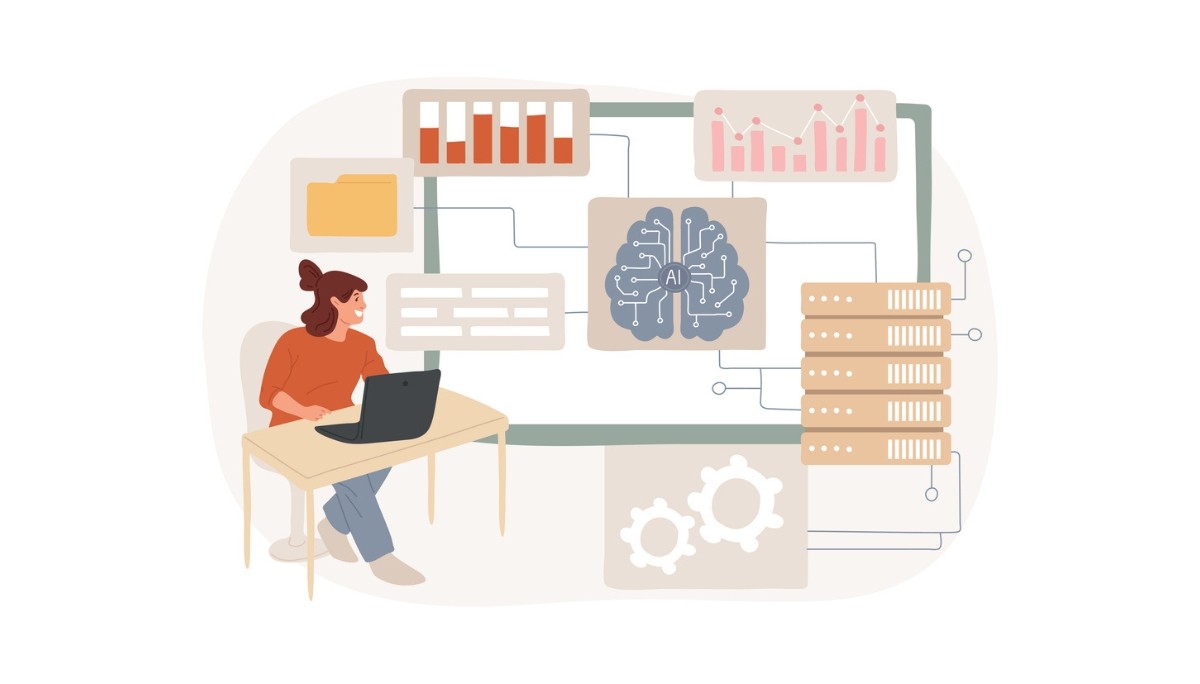Computer Engineering vs. Computer Science: Salaries, Skills & Careers
By
Liz Fujiwara
•
Aug 6, 2025
Are you curious about what computer engineering involves and how it differs from computer science? Computer engineering is a dynamic field that blends the fundamentals of electrical engineering with the concepts of computer science to design, build, and optimize both hardware and software systems. Unlike computer science, which focuses more on software development and algorithms, computer engineering bridges the gap between hardware and software, enabling the creation of integrated systems that power everything from everyday gadgets to complex computing infrastructures.
This article explores the history and evolution of computer engineering, highlights its core disciplines, outlines the essential skills required, and explores the diverse career paths available to those entering this exciting field. Whether you’re considering a career in technology or just want to understand how the devices you use every day are engineered, this article will provide a comprehensive overview of what computer engineering is all about.
Key Takeaways
Computer engineering has evolved significantly from its early beginnings, with modern advances such as AI and neuromorphic computing reshaping the field and paving the way for future technologies like 5G and edge computing.
Essential skills for computer engineers include technical proficiencies in hardware-software integration, programming, problem-solving, and strong communication abilities, all of which are critical for effective collaboration and technology development.
Career opportunities in computer engineering are diverse, spanning roles in hardware design, software development, and specialized areas like AI and cybersecurity. These opportunities come with promising salary potential and job growth fueled by ongoing technological advancements.
The Evolution of Computer Engineering

Computer engineering has come a long way since its inception, playing a crucial role in the development of modern technology. From the early days of foundational computing machines to the rapid advances seen in recent years, the field has continuously evolved to meet the demands of an increasingly digital world. Designing and optimizing technology lies at the heart of computer engineering, especially within the context of Industry 4.0.
Historical milestones in computer engineering have not only shaped the technology we use today but also laid the groundwork for future innovations. As we look ahead, the impact of these developments on computer systems and software engineering becomes even more apparent.
The future of computer engineering holds exciting prospects, with emerging technologies poised to revolutionize how we interact with the world. Understanding these advancements requires examining the early beginnings, recent progress, and future possibilities of the field.
Early Beginnings
The journey of computer engineering began with monumental milestones such as Konrad Zuse’s creation of the Z3 in 1941, widely recognized as the first fully functional programmable computer. Shortly thereafter, the development of the ENIAC in the 1940s marked a major leap in computational capability, setting the stage for the evolution of increasingly complex computing systems.
These early technologies laid the essential foundation for the rapid advances and sophisticated computer systems we rely on today.
Modern Advances
In recent years, groundbreaking innovations in artificial intelligence and machine learning have significantly enhanced computing efficiency and capabilities. The evolution of neuromorphic computing, which mimics the architecture of the human brain, is paving the way for more efficient and intelligent computing systems.
These advances are more than just technological marvels; they are reshaping the landscape of computer science, computer networks, and software development.
Future Prospects
Looking to the future, technologies like 5G and edge computing are set to revolutionize computer engineering by providing faster and more efficient processing and connectivity. These emerging technologies will have a transformative impact, enhancing data processing and communication and leading to more responsive and intelligent systems.
Core Disciplines in Computer Engineering

Computer engineering is a multifaceted field that integrates principles from both computer science and electrical engineering, along with insights from other engineering disciplines. It encompasses several core areas, each playing a vital role in the development and optimization of technology. These include hardware engineering, software systems, and embedded systems, offering a balanced focus on both hardware and software integration.
Within these core areas, computer engineers learn to design digital circuits, develop software, and integrate hardware and software systems. This holistic approach ensures that computer engineering majors are well-equipped to tackle a wide range of technological challenges, from designing computer hardware to developing sophisticated software systems.
Hardware Engineering
Hardware engineering is a cornerstone of computer engineering, focusing on the design, development, and testing of physical components such as processors and integrated circuits. Computer hardware engineers typically work in research laboratories, computer systems design services, and manufacturing. They apply their knowledge of electronics and electrical systems to create efficient and reliable hardware.
Key areas of focus include Very Large Scale Integration (VLSI) design, which aims to enhance the speed, reliability, and energy efficiency of circuits and microsystems.
Beyond traditional hardware components, computer engineers are increasingly involved in cutting-edge fields like quantum computing and Internet of Things (IoT) devices. Quantum computing, in particular, represents a transformative approach to processing information, with the potential to solve complex problems faster than traditional computers.
Software Systems
Software systems are integral to computer engineering, involving the development of operating systems, program analysis techniques, and quality assurance methods. Engineers in this field focus on creating efficient and reliable software that is essential for the functionality of modern computer systems.
A strong understanding of software development frameworks is crucial for structuring and managing the software creation process, ensuring that systems are both robust and user-friendly.
Collaboration and effective communication are also key, as computer engineers often work in teams to tackle complex problems and develop innovative software solutions. This interdisciplinary approach ensures software systems are well integrated with hardware components, providing a seamless user experience.
Embedded Systems
Embedded systems represent the integration of hardware and software to enhance functionality across various industries. Computer engineers working in this field develop software for applications such as artificial intelligence tools, speech processing, and visual sensing technologies used in computer vision and robotics. These systems enable devices to interact intelligently with their environments, making them essential in areas like the Internet of Things (IoT) and edge computing.
Specializations within embedded systems include system-on-chip design and edge computing architecture, offering tailored solutions for specific applications. These advancements underscore the critical role of embedded systems in computer engineering and the importance of expertise in both hardware and software integration.
Essential Skills for Computer Engineers

Success in computer engineering requires a blend of technical expertise and soft skills. Key technical skills include proficiency in hardware-software integration, software design, and software engineering. Equally important are strong communication skills and problem-solving abilities, which are essential for collaborating effectively with teams and addressing complex engineering challenges.
These essential skills can be grouped into three main categories: programming skills, problem-solving skills, and communication skills. Together, they enable computer engineers to develop efficient, reliable, and user-friendly technology solutions.
Programming Skills
Programming skills are foundational for computer engineers, enabling them to create, optimize, and troubleshoot software effectively. Essential programming skills include:
Familiarity with multiple programming languages such as Assembly, C++, and Python
A solid understanding of Object-Oriented Programming (OOP) principles
Knowledge of key computer science concepts, including algorithms, data structures, and debugging techniques
Mastering these skills is critical for developing robust, efficient, and maintainable software systems. These competencies are typically introduced in foundational courses, which provide a strong base for tackling more advanced topics in computer science and engineering. Given the rapid evolution of technology, continuous learning and regularly updating one’s programming knowledge are necessary to remain competitive and effective in the field.
Problem-Solving Skills
Problem-solving skills are indispensable for computer engineers, empowering them to develop effective solutions to complex technical challenges. Strong analytical abilities combined with a methodical approach to dissecting problems enable engineers to innovate, optimize systems, and improve project outcomes.
These skills extend beyond technical know-how to include creative thinking, adaptability, and flexibility, qualities essential for navigating new situations and rapidly evolving technologies. The ability to approach problems from multiple angles fosters innovation and resilience in the face of unexpected obstacles.
Communication Skills
Effective communication skills enable computer engineers to collaborate efficiently with teams and convey complex technical information. Whether working with colleagues or presenting ideas to stakeholders, the ability to explain technical concepts in an understandable way is essential for successful project execution and maintaining strong team dynamics.
Career Paths in Computer Engineering

Career paths for computer engineers are diverse, offering numerous opportunities for specialization and advancement. Roles range from network architects to software developers, catering to various interests and skill sets. Internships are essential for gaining practical experience and significantly improving career prospects for aspiring computer engineers. Exploring different job titles, roles, and specialized positions provides a clearer understanding of potential career trajectories within computer engineering.
Job Titles and Roles
Common career paths for computer engineers include roles such as network architect, database administrator, and software developer. Each role has specific responsibilities; for example, software developers design and maintain software applications while computer programmers write code and troubleshoot issues. Understanding these roles can help you identify which path best aligns with your skills and career goals.
Specialized Jobs
Specialized jobs in computer engineering and related fields include areas such as artificial intelligence, cybersecurity, and robotics. Advanced qualifications in these areas can make candidates more competitive and unlock opportunities in high-demand positions. These roles often require a deep understanding of specific technologies and a commitment to ongoing learning and skill development.
Job Outlook and Salaries
The job outlook for computer engineers is promising, driven largely by the integration of AI across various industries. Key points include:
The projected employment growth rate for computer hardware engineers from 2023 to 2033 is 7 percent.
This marks an increase from the expected job growth of 2 percent between 2019 and 2029.
Careers in computer science generally have even higher growth projections.
Salaries in the field are also attractive. The median annual wage for computer hardware engineers is $155,020. Software developers, quality assurance analysts, and testers can expect an average salary of around $130,160, while firmware engineers earn approximately $156,132 annually. These figures emphasize the strong financial benefits of pursuing a career in computer engineering.
Comparing Computer Engineering and Computer Science
While computer engineering and computer science share some similarities, they differ significantly in focus and application. Computer engineering centers on hardware design and systems integration, relying heavily on principles from electrical engineering. On the other hand, computer science emphasizes software development and theoretical foundations, covering a wider spectrum of technology applications. Understanding these distinctions can help you choose the field that best matches your interests and career objectives.
Educational Requirements
Educational requirements for computer engineering and computer science vary, although both fields typically require a bachelor’s degree as a minimum. To become a computer hardware engineer, a bachelor’s degree from an accredited program is essential. Computer science degrees, meanwhile, tend to focus more on software development and theoretical computation, providing a different academic emphasis. For advanced positions in either field, pursuing a master’s degree can improve career opportunities and increase earning potential.
Skill Sets
The skill sets for computer engineering and computer science share some overlap but also have distinct differences. Computer engineers must be proficient in both hardware design and software development, combining practical skills with theoretical knowledge. Their training places a stronger emphasis on electrical engineering principles compared to computer science programs. On the other hand, computer science focuses more on programming fundamentals, theoretical computation, and software development methodologies. For computer engineers, key skills include expertise in hardware design and a solid understanding of embedded systems.
Career Opportunities
Career opportunities in computer engineering and computer science are diverse, with each field offering its specialized roles. Computer engineering careers typically focus on hardware design and systems integration, while computer science careers emphasize software development, programming, and data analysis.
Positions such as network administrators, database architects, and information systems managers are common across both fields, with salaries varying according to expertise and responsibilities. Additionally, both disciplines provide opportunities in tech companies, cybersecurity, data analysis, and IT consulting, allowing professionals to work in a wide range of industries and applications.
Preparing for a Career in Computer Engineering

Aspiring computer engineers should develop a strong combination of technical and soft skills to thrive in today’s competitive job market.
Preparing for a career in computer engineering includes building a solid technical foundation, pursuing advanced degrees when appropriate, and preparing effectively for interviews to showcase both knowledge and problem-solving abilities.
Building New Skills
Building new skills in computer engineering is crucial for staying relevant and competitive in the field. This often involves taking courses in emerging programming languages, updating knowledge in areas such as web design and cybersecurity, and participating in in-house training programs. Popular courses like Fundamentals of Computing and IBM AI Developer attract many students aiming to expand their expertise.
Continuous learning enables engineers to keep pace with evolving technologies and methodologies, ensuring they remain effective and innovative throughout their careers.
Pursuing Advanced Degrees
Obtaining a master’s degree in computer engineering can significantly enhance your career prospects. Advanced degrees are often required for specialized roles and can lead to higher salary potential and better job opportunities.
Pursuing a master’s degree is a strategic move for long-term career success.
Interview Preparation
Effective interview preparation is essential for standing out in the competitive tech job market. Practicing common technical questions and rehearsing your answers with a fellow engineer can build confidence and improve your delivery. Dressing professionally also helps convey your seriousness and respect for the opportunity.
Demonstrating strong communication and problem-solving skills during the interview can differentiate you from other candidates and leave a lasting positive impression.
How Fonzi Supports Computer Engineers
Fonzi provides a variety of tools and services tailored to support computer engineers in their job search and career growth. By matching candidates with relevant opportunities, Fonzi streamlines the job search process and helps professionals advance their careers.
Additionally, Fonzi works to reduce bias in hiring, boost the efficiency of match day, and uses human-centered AI to assist recruiters in making better hiring decisions.
Reducing Bias in Hiring
Fonzi employs bias-audited assessments to reduce unconscious bias during hiring, promoting fairness and transparency throughout the evaluation process. By using these auditing tools, Fonzi helps ensure that candidate assessments are impartial, improving the overall quality and equity of hiring decisions.
Match Day Efficiency
Fonzi’s Match Day event brings candidates face-to-face with leading large firms, making the hiring process faster and more efficient. By streamlining connections between job seekers and employers, Match Day helps secure quicker placements at top companies.
Summary
In summary, computer engineering and computer science offer unique but complementary career paths, each with distinct educational requirements, skill sets, and opportunities. Whether you’re drawn to the hardware-focused challenges of computer engineering or the software-driven aspects of computer science, both fields present strong prospects for growth and professional development.
As you advance in your career, continuously developing your skills, pursuing advanced education, and preparing thoroughly for interviews will be essential. Leveraging platforms like Fonzi can further support your job search by connecting you with leading companies and streamlining the hiring process.
Discover what you’re passionate about and begin building the path to a rewarding and successful career in technology.




